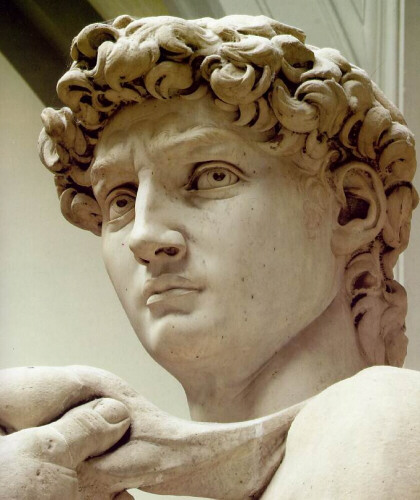 David: The Original Drama King
David: The Original Drama King
Reviewed:
Robert Pinsky, The Life of David
Schocken 2005. 208pp. $19.95
Joseph Heller’s God Knows -- a gloriously anachronistic first person account of the life of King David -- starts with David explaining why he’s got the “the best story in the Bible.” From the young, slightly-built shepherd boy who can play the lyre well enough to relieve King Saul’s headaches, David becomes the hero who slays the giant Goliath , and eventually, a king who fights, writes, loves, and mourns with charismatic spectacle. As he himself points out, with Heller’s help,
“I have suicide, regicide, patricide, homicide, fratricide, infanticide, adultery, incest, hanging, and more decapitations than just Saul’s…
I had sons.
I had concubines.
I had a son who went unto my concubines in broad daylight on the roof of my palace.”
And this is just the start of it.
 Given the Jewish prominence and drama of David’s story, it is unsurprising that Jonathan Rosen (author of The Talmud and the Internet and, more recently, the novel Joy Comes in the Morning) has chosen Robert Pinsky’s The Life of David to kick off the new “Jewish Encounters” series of books. The series promises to bring “books on Jewish subjects written in a lively, intelligent, and popular manner,” and there is certainly plenty of scope for Pinsky, the former poet laureate of the United States, and the author of the brilliant recent translation of Dante’s Inferno, to enthuse about the layers of drama and development in the biblical story. As a translator, a poet and a popularizer, Pinsky is ideally placed to bring out both the emotional nuances of the psalms and the epic scope of the biblical melodrama.
Given the Jewish prominence and drama of David’s story, it is unsurprising that Jonathan Rosen (author of The Talmud and the Internet and, more recently, the novel Joy Comes in the Morning) has chosen Robert Pinsky’s The Life of David to kick off the new “Jewish Encounters” series of books. The series promises to bring “books on Jewish subjects written in a lively, intelligent, and popular manner,” and there is certainly plenty of scope for Pinsky, the former poet laureate of the United States, and the author of the brilliant recent translation of Dante’s Inferno, to enthuse about the layers of drama and development in the biblical story. As a translator, a poet and a popularizer, Pinsky is ideally placed to bring out both the emotional nuances of the psalms and the epic scope of the biblical melodrama.
As Pinsky points out, we all know a lot more Davids than, for example, Ishbosheths. And there have been countless others who, before Heller and Pinsky, have exhumed the myth of the biblical David. In children’s books of stories from the Bible (most notably David Kossoff’s, which featured David and Goliath on the cover), David is an everpresent figure. Donatello and Michelangelo both made famous statues of him. And the State of Israel has identified deeply with the mythology of the plucky little shepherd since before its independence. Most famously in modern literature – if most obliquely – Faulkner alludes to David with the deliberate misquotation in the title Absalom, Absalom! (David laments the murder of his son Absalom but his eightfold lament is “my son!” not “Absalom!”).
Still, until Heller’s fictional account (in 1984) and Pinsky’s open-mouthed consideration (this month) none have explored the length and breadth of his career, and its depiction, in such detail. Despite being known as the slayer of Goliath, most of his long career is obscured from celebrity -- at least among the wider secular public -- by the shadows of his early success. Bathsheba and Absalom have compelling stories, certainly with more layers of emotional complexity than the brute Goliath, but their tales are hardly canonical. Likewise, the brutal, calculating, incestuous rape of Tamar by David's son Amnon is apparently not well-known enough to deter people from naming their daughters after her (unless, of course, they are naming their children after the other incestuous Tamar, Judah's daughter-in-law, an ancestor of David).



Sephardic Literature: The Real Hidden Legacy
David Shasha
plus Jordan Elgrably on the Sephardic Intellectual
Guilt and Groundedness
Jay Michaelson
David: The Original Drama King
Dan Friedman
The Doctor
Sarah Schulman
After sepia photographs
Hila Ratzabi
A War in Postcards
Alon K. Raab
Archive
Our 760 Back Pages
Zeek in Print
Summer 2005 issue now on sale
About Zeek
Mailing List
Contact Us
Subscribe
Tech Support
Links
Limited Time Offer
Two years of Zeek in
print for only $20.
Offer expires 9/30.
Click this button
to purchase:
From previous issues:
I hear America Bling-blinging
The Hasidim
Wisconsin
Jay Michaelson
Hila Ratzabi
Chanel Dubofsky